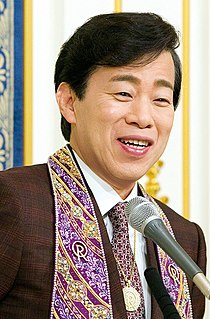A Quote by Dalai Lama
I want to show that there are indeed some universal ethical principles which could help everyone to achieve the happiness we all aspire to.
Related Quotes
I think there are universal principles that we should want to understand, but that are not necessarily good for us. We could recognise universal propensities which current cultures can't fully eradicate, which we would want to eradicate if we could. Let's say, a tendency for tribal violence. Or racism.
Perhaps, indeed, there are no truly universal ethics: or to put it more precisely, the ways in which ethical principles are interpreted will inevitably differ across cultures and eras. Yet, these differences arise chiefly at the margins. All known societies embrace the virtues of truthfulness, integrity, loyalty, fairness; none explicitly endorse falsehood, dishonesty, disloyalty, gross inequity. (Five Minds for the Future, p136)
We should go to the masses and learn from them, synthesize their experience into better, articulated principles and methods, then do propaganda among the masses, and call upon them to put these principles and methods into practice so as to solve their problems and help them achieve liberation and happiness.
I should like to help everyone if possible; Jew, Gentile, black man, white. We all want to help one another. Human beings are like that. We want to live by each other’s happiness, not by each other’s misery. We don’t want to hate and despise one another. In this world there is room for everyone, and the good earth is rich and can provide for everyone. The way of life can be free and beautiful.
Principles always have natural consequences attached to them. There are positive consequences when we live in harmony with the principles. There are negative consequences when we ignore them. But because these principles apply to everyone, whether or not they are aware, this limitation is universal. And the more we know of correct principles, the greater is our personal freedom to act wisely.
It is one of my targets to show people that a lot of things that are part of their landscape - that people are universal - are the result of some very precise historical changes. All my analyses are against the idea of universal necessities in human existence. They show the arbitrariness of institutions and show which space of freedom we can still enjoy and how many changes can still be made.







































